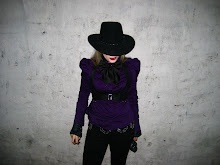
Either an abomination or an aesthete's wet dream, Lapham's Quarterly is a literary journal like no other. Lewis H. Lapham, a former editor of Harper's, has created a publication that culls together lauded texts and images of the past filtered through a topical lens and contextualized with new contributions by the greats of today. It's the worst of channel surfing intellectualism or the best of post-modern ideological bricolage. Each issue presents a starting point for countless works of literature and schools of thought, constructing new contexts by situating disparate thinkers side by side. While the writers/artists tend to have a Eurocentric bent, the series has included many lesser known members of the global creative canon such as Japanese father of Noh drama Zeami, Persian lyric poet Hafiz, and Chinese literary critic Lu Ji.
Lapham's celebrates fragmentation and discontinuity while paradoxically presenting cohesive themes. The Spring 2010 issue, Arts & Letters, aims to examine how artists and their art have interacted with society throughout time. Amongst Nabokov, Van Gogh, James Baldwin, and a government report detailing the meeting between Elvis Presley and Richard Nixon, is a new essay by Salman Rushdie and a staged textual dialogue between Walter Benjamin and Andy Warhol. Between these excerpts are games, diagrams, and tables that present pertinent factoids like which mind-altering substances were used to create what great literary works (Uppers: Sarte's Critique of Dialectical Reason, Psychedelics: Huxley's Doors of Perception) or what songs were featured during which US presidential campaigns (Mondale: "Theme from Rocky," Dukakis: Neil Diamond's "America"). I'm still reeling from the mention of T-Pain, Matthew Barney, Hokusai, Harriet Beecher Stowe, and Ovid all in a single publication!
Like it or not, this byte size interdisciplinary approach to history and knowledge is fast becoming the future of thought. In both form and content, Lapham's Quarterly is a series tailor made for a post-internet world. It turns teleology on its head by offering a virtual reality on paper where turning a page is tantamount to jumping across milennia. Flip (click?) through a web of philosophical threads that are strung together Wikipedia-style until you're not quite sure where the original origin of your search lies. By all definitions, Lapham's is a dilettante's domain: how you choose to read it, however, is entirely up to you.




















